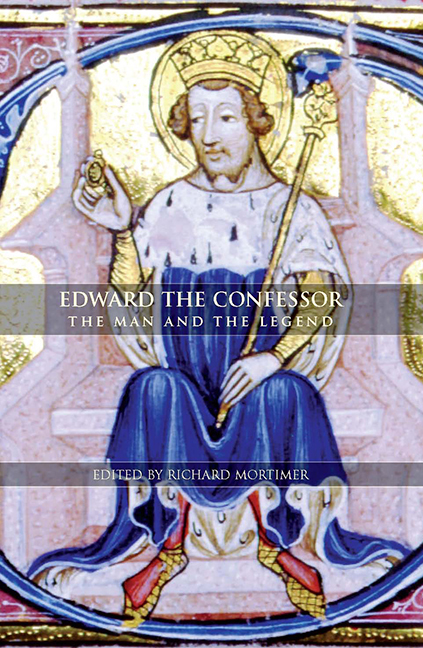Book contents
- Frontmatter
- Contents
- List of illustrations
- List of maps
- Preface
- Abbreviations
- Genealogical table
- 1 Edward the Confessor: the Man and the Legend
- 2 Edward the Ætheling (c. 1005–16)
- 3 Edward and Normandy
- 4 Edward the Confessor and the Succession Question
- 5 Edith, Edward's Wife and Queen
- 6 Edward the Confessor's Westminster Abbey
- 7 New Glimpses of Edward the Confessor's Abbey at Westminster
- 8 Craftsmen and Administrators in the Building of the Confessor's Abbey
- 9 The Sanctity and Canonisation of Edward the Confessor
- Bibliography
- Index
4 - Edward the Confessor and the Succession Question
Published online by Cambridge University Press: 25 October 2017
- Frontmatter
- Contents
- List of illustrations
- List of maps
- Preface
- Abbreviations
- Genealogical table
- 1 Edward the Confessor: the Man and the Legend
- 2 Edward the Ætheling (c. 1005–16)
- 3 Edward and Normandy
- 4 Edward the Confessor and the Succession Question
- 5 Edith, Edward's Wife and Queen
- 6 Edward the Confessor's Westminster Abbey
- 7 New Glimpses of Edward the Confessor's Abbey at Westminster
- 8 Craftsmen and Administrators in the Building of the Confessor's Abbey
- 9 The Sanctity and Canonisation of Edward the Confessor
- Bibliography
- Index
Summary
THIS PAPER confronts the implications of a question which preoccupied King Edward and the nobility of England and her neighbours throughout his reign: who would succeed Edward? Lying behind this question is another, more difficult one: whom did Edward favour as his successor? William of Malmesbury became one of the first historians to approach this problem when he wrote his Gesta Regum Anglorum in the 1120s, and he found the evidence so problematic he felt compelled to alert his audience to the difficulties it posed. Before describing one of the decisive episodes of the reign (the crisis of 1051−2), he remarks:
I should like to warn the reader that here I perceive the course of my narrative to be somewhat in doubt because the truth of the facts is in suspense and uncertain.
The problem, he explains, is that the English and Norman sources are difficult to reconcile:
It is these differences of opinion which, as I have said, put my narrative at risk, since I cannot decide what precisely is the truth.
It would be hard to improve on this judicious assessment. The facts are indeed uncertain, principally because there is so little common ground in the English and Norman sources; and for that reason, it is impossible to determine the truth with any confidence. Needless to say, this did not dissuade William from attempting his own, somewhat confused reconstruction of events. Nor has it discouraged subsequent historians: on the contrary, the subject has become one of the great controversies of English history.
Freeman's monumental History of the Norman Conquest, first published between 1867 and 1879, transformed this controversy, and laid the foundations for all subsequent work in the field. Taken as a whole, Freeman's History is a frustrating combination of narrative genius, erudition and patriotic bigotry, and its treatment of the succession question is no exception: Freeman's account of the politics of Edward's reign is one of the great achievements of historical narrative, and is underpinned by a series of exhaustive, and still invaluable, analytical appendices; but it is also shot through with nationalist prejudice.
- Type
- Chapter
- Information
- Edward the ConfessorThe Man and the Legend, pp. 77 - 118Publisher: Boydell & BrewerPrint publication year: 2009



